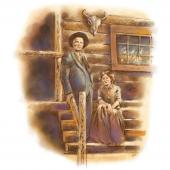Wild West Words: Hygiene, Ballistic, & Survey

HYGIENE
The ancient Greek world was full of powerful, dynamic monsters and deities. The sea-god Neptune, flourishing his trident, provoked maritime tempests. Zeus, the king of the Greek gods, presided over thunder, lightning and rain, while the Gorgons, three horrible snake-haired sisters, turned people to stone with their piercing gaze. Dozens of such ancient deities manipulated celestial manifestations and human destinies.
But amidst the Olympian chaos and drama was a goddess who worked quietly on behalf of humanity: Hygiea, the Greek personification of good health. Hygiea learned the healing arts from her father, a powerful god of medicine. Early physicians appealed to the goddess for wisdom in the original Hippocratic oath from the 5th century BC, which stated, "I swear by Apollo the physician, and likewise Hygiea, and call all the gods and goddesses to witness, that I will observe and keep this oath, to the utmost of my power and judgment.
Though the goddess is now a bit of a footnote on the pages of Greek mythological texts, Hygiea lives on in our vocabulary. From her name comes the word hygiene, the science of healthy living.
The Oxford English Dictionary's scholars find hygiene in place in English documents by the late 1500s. Though Montana's first English speakers might have known the word, the goddess' namesake science may have been too subtle for pioneers and explorers. But when exploration was swapped for domestication and permanent dwellings throughout the West, citizens gradually adopted culturally appropriate hygiene standards. Though her mythological heritage is seldom sung, the goddess Hygiea has taken linguistic residence in our homes, businesses and communities.

BALLISTIC
The verb phrase go ballistic is a newcomer to American English. A slangy way to express sudden, intensifying anger, go ballistic wasn't common until the mid-1980s. George H. W. Bush, not averse to slang, said in a 1988 New York Times interview, "I get furious. I go ballistic. I really do and I bawl people out."
Though go ballistic is new and a bit sassy, its foundation is pure old-school Greek. Ballistic comes ultimately from ballein, "to throw." When ballistic entered the English language in the late 1700s, it meant "pertaining to construction and use of thrown objects."
The term was applied to increasingly sophisticated projectiles, arriving at rocket and missile science in the 1950s. A ballistic missile, guided by propulsion, falls freely after reaching maximum height, hence go ballistic, figuratively to discharge and then fall out of control with emotion.

SURVEY
Both a noun and a verb, survey has a long history in the English language. It arrived in the English language around 1400 as a verb meaning "to consider, oversee." We can trace the word to its classical roots: the sur of survey is a relic of the Latin super, "over." The remainder comes from the very productive Latin verb videre, "to see (also the source of the words view, vision, video, vista and visible)."
By Shakespeare's lifetime, the word was a noun for the process of "overseeing" a tract of ground, coastline, or any part of the earth's surface. London writer William Folkingham, in his 1610 publication Feudigraphia wrote that survey is "an Art whereby the view and trutinate intimation of a subject, from Center to Circumference, is rectified. The Survey of Possessions…is the Arts by which their Graphicall Description is particularized."
In the 20th century, the word was recruited to refer to a different kind of "overseeing." A survey became a systematic collection and analysis of data relating to a population, as in commercial survey, public opinion survey and social survey.

Chrysti "The Wordsmith" Smith was born some decades ago in Poplar, where she misspent her youth riding horses and motorcycles. Putting those things behind her as adult, she turned toward studies in archeology/anthropology at MSU, where she also accidentally discovered radio broadcasting. She has been producing "Chrysti the Wordsmith" at MSU's radio facility, KGLT-FM, since 1990.











Leave a Comment Here